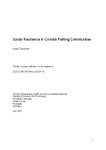Social Resilience in Cornish Fishing Communities
| dc.contributor.supervisor | Wilson, Geoff | |
| dc.contributor.author | Thomas, Huw | |
| dc.contributor.other | School of Geography, Earth and Environmental Sciences | en_US |
| dc.date.accessioned | 2017-08-08T09:21:10Z | |
| dc.date.issued | 2017 | |
| dc.date.issued | 2017 | |
| dc.identifier | 257671 | en_US |
| dc.identifier.uri | http://hdl.handle.net/10026.1/9690 | |
| dc.description.abstract |
Rural Cornish coastal fishing communities express, and have expressed, varying degrees of ability to develop and retain social resilience capacity, or the ability to withstand ‘shock’ over both ‘fast’ and ‘slow’ onset events in social, political, economic and natural domain terms (Wilson, 2012a). Endogenous and exogenous influences may include natural changes in resources and resource dependency resulting in the loss or depletion of community livelihoods associated with a decline in fishing activities (Brookfield, 2005; Marshall, 2007a), issues of tourism driven change and notions of ‘community’. Four capitals are initially conceptually considered, those of natural, political, social and economic capitals driving institutional change and individual-community behaviour within fishing communities. This is considered for fishing activities and cross-community aspirational or extant forms of resilience building with a particular focus on social memory, community-personal identity (Wilson, 2012b; Wilson, 2013; Wilson, 2014) and critically, power (Chaskin, 2001). This research frames community resilience within a resilience framework on local, national and EU scales. The initial capital approach is further developed and articulated into a novel resilience status and process framework, the community resilience and vulnerability index, or the CRVI. The research fieldwork observes social resilience through empirical qualitative methods supported by an anthropological lens, especially in regard to social issues, trust, confidence, power and agency within fishing communities and trajectories that have been guided by internal and external influences and adaptive change to social networks. One of the research challenges was the building of the CRVI using coupled approaches to coping strategies that may have value both across the Cornish case study communities and into wider community usage. | en_US |
| dc.language.iso | en | |
| dc.publisher | University of Plymouth | |
| dc.subject | Social resilience | |
| dc.subject | Community | |
| dc.subject | Fishing community | |
| dc.subject | Slow-onset | |
| dc.subject | Power | |
| dc.subject | Cornwall | |
| dc.subject | Resilience | en_US |
| dc.subject.classification | PhD | en_US |
| dc.title | Social Resilience in Cornish Fishing Communities | en_US |
| dc.type | Thesis | |
| plymouth.version | publishable | en_US |
| dc.identifier.doi | http://dx.doi.org/10.24382/468 | |
| dc.rights.embargodate | 2018-08-08T09:21:10Z | |
| dc.rights.embargoperiod | 12 months | en_US |
| dc.type.qualification | Doctorate | en_US |
| rioxxterms.funder | European Social Fund | en_US |
| rioxxterms.identifier.project | ESF Convergence | en_US |
| rioxxterms.version | NA | |
| plymouth.orcid.id | 0000-0002-6781-3108 | en_US |
Files in this item
This item appears in the following Collection(s)
-
01 Research Theses Main Collection
Research Theses Main


